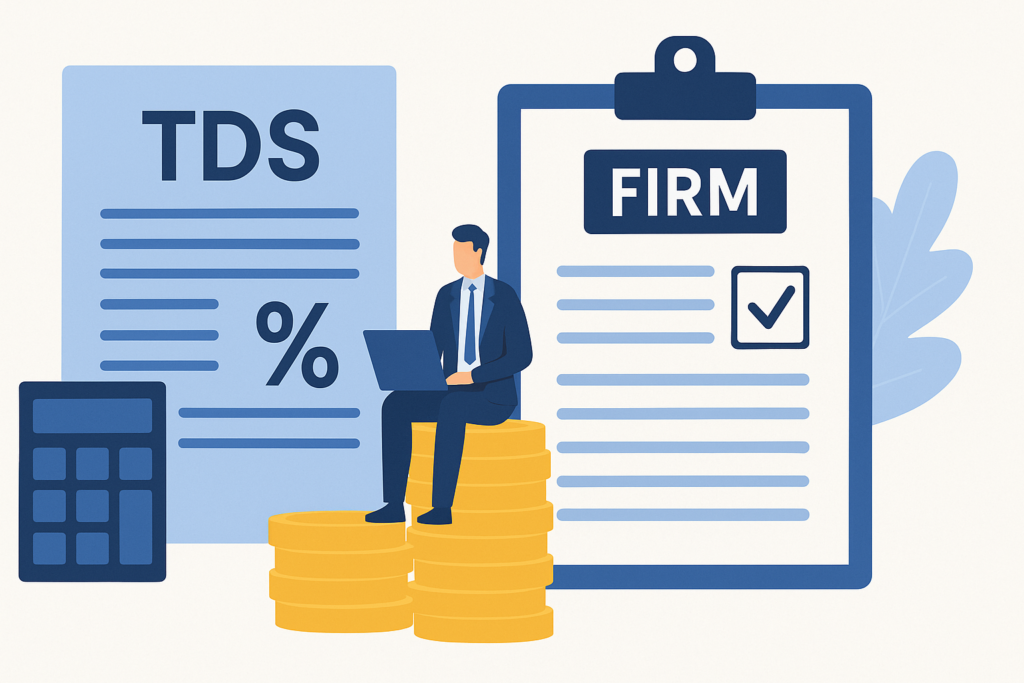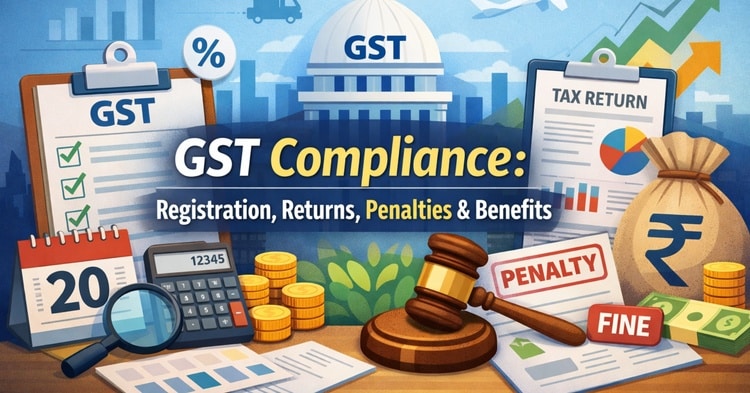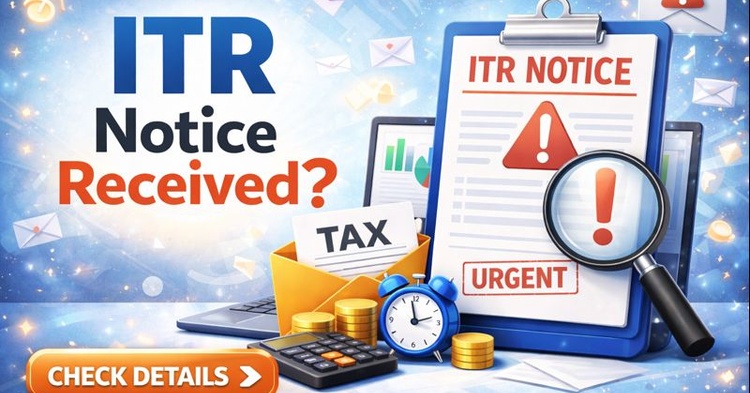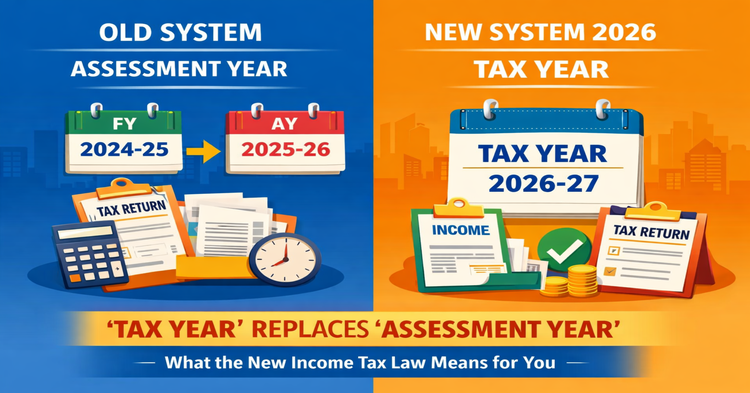Table of Contents
ToggleIntroduction to TDS and Its Importance
Before understanding TDS applicability on proprietorship firm let first understand the TDS. Tax Deducted at Source (TDS) is a way for the government to collect income tax at the place where it is earned. The idea is to collect tax from the very point of payment, ensuring steady revenue inflow and reducing tax evasion. Businesses, including proprietorships, must act as deductors and deposit the TDS with the government within prescribed timelines.

Understanding Proprietorship Firms in India
In India, a proprietorship is one of the easiest types of business to run. Owned and managed by a single individual, it’s not considered a separate legal entity distinct from the owner. Hence, its tax obligations are closely tied to the personal income tax of the proprietor. However, this doesn’t mean they are exempt from deducting TDS if specific conditions are met.
General Rule of TDS Applicability
Under the Income Tax Act, entities or individuals making specific payments such as salary, contractor fees, professional fees, rent, or interest are required to deduct TDS, provided certain criteria are satisfied. These payments are subject to different sections of the Act, and failure to deduct or deposit TDS can attract heavy penalties.
TDS Applicability on Proprietorship Firms
Now, let’s address the key question—Is TDS applicable to proprietorship firms?
Yes, a proprietorship is required to deduct TDS only if the business turnover exceeds ₹1 crore in the case of a business or ₹50 lakh in the case of a profession in the preceding financial year under Section 44AB of the Income Tax Act.
If the turnover is below the specified limits, TDS obligations do not apply unless the proprietor is paying salary or engaging in contracts under special provisions (like Section 194M).
Threshold for TDS Deduction by Proprietorship
A proprietorship firm becomes liable to deduct TDS when:
Turnover exceeds ₹1 crore (business) or ₹50 lakh (profession) in the previous year.
The proprietor makes payments falling under TDS sections such as salary, contract, professional services, etc.
A TAN (Tax Deduction and Collection Account Number) is mandatory to deduct TDS.
Even individuals and HUFs, when their payments for work, commission, or professional services cross ₹50 lakh, may be required to deduct TDS under Section 194M.
Key TDS Sections Applicable to Proprietorship Firms
Here are the main sections under which a proprietorship firm might be liable to deduct TDS:
| Section | Nature of Payment | Threshold Limit | TDS Rate |
|---|---|---|---|
| 192 | Salary | As per slab rates | As per slab |
| 194C | Contract | ₹30,000 (single)/₹1,00,000 (annual) | 1%-2% |
| 194J | Professional Services | ₹30,000 | 10% |
| 194H | Commission/Brokerage | ₹15,000 | 5% |
| 194I | Rent | ₹5,00,000 | 2%-10% |
Scenarios When TDS is Mandatory for Proprietors
A business with ₹1.5 crore turnover in FY 2023-24 hires a contractor for ₹60,000.
Must deduct TDS @ 1% under Section 194C.
The same business pays a consultant ₹75,000.
TDS @ 10% under Section 194J applies.
Scenarios Where TDS is Not Applicable for Proprietors
If the turnover of the business in the previous financial year was below the limits.
If the payment is personal in nature (e.g., personal rent, household salary).
Payments below the prescribed thresholds for TDS deductions.
TDS Deduction Process for Proprietorship Firms
Once a proprietorship becomes liable to deduct TDS, the following steps must be followed diligently:
Obtain TAN: Apply for a Tax Deduction and Collection Account Number (TAN) using Form 49B or online via the NSDL portal.
Identify TDS Sections: Determine which section the payment falls under (e.g., 194C for contractors, 194J for professionals).
Verify Thresholds: Ensure the payment exceeds the applicable threshold for TDS deduction.
Deduct TDS at Source: Deduct TDS at the correct rate while making the payment to the payee.
Deposit TDS with Government: TDS must be deposited using Challan ITNS 281 on or before the 7th of the next month.
Issue TDS Certificates: Provide Form 16 (for salary) or Form 16A (for non-salary) to the deductee.
File TDS Returns: Quarterly TDS returns must be filed using Form 24Q (salary) or Form 26Q (non-salary).
TDS Payment and Return Filing Requirements
| Activity | Form/Challan | Due Date |
|---|---|---|
| TDS Deposit | Challan ITNS 281 | 7th of next month |
| TDS Return – Q1 | Form 24Q/26Q | 31st July |
| TDS Return – Q2 | Form 24Q/26Q | 31st October |
| TDS Return – Q3 | Form 24Q/26Q | 31st January |
| TDS Return – Q4 | Form 24Q/26Q | 31st May |
Penalties for Non-Compliance by Proprietorship Firms
Non-compliance with TDS rules can attract serious consequences:
Late Deduction: Interest @ 1% per month
Late Deposit: Interest @ 1.5% per month
Late Return Filing: ₹200 per day under Section 234E
Failure to File Return: Penalty up to ₹1 lakh under Section 271H
Hence, proprietorship firms must ensure timely deduction, deposit, and filing to avoid these penalties.
TDS on Payments to Individuals and Professionals
If a proprietor makes payments to consultants, chartered accountants, or freelancers exceeding ₹30,000 annually, TDS must be deducted under Section 194J at 10%. This is common in IT services, legal services, and digital marketing consultations.
TDS on Salary Paid by Proprietors
If a proprietorship employs staff and pays salary exceeding the basic exemption limit, TDS under Section 192 becomes applicable. Here’s how it works:
TDS is calculated on the estimated income tax liability of the employee.
The employer must consider exemptions and deductions while computing TDS.
Form 16 must be issued annually to the employee.
Exemptions and Relaxations for Small Proprietors
For proprietors not liable for tax audit (i.e., turnover below ₹1 crore/₹50 lakh), TDS is generally not applicable, except under certain provisions:
Section 194M: If total payments for professional services, contract, or commission exceed ₹50 lakh in a year, even individuals and HUFs must deduct TDS @ 5%.
This provision ensures that even high-value transactions by individuals do not escape the TDS net.
Practical Examples of TDS Deduction in Proprietorship Firms
Case 1: Contractor Payment
Mr. Arjun runs a furniture store with ₹1.2 crore turnover.
He hires a carpenter for ₹45,000 – TDS @ 1% under 194C = ₹450
Case 2: Consultant Payment
Ms. Rina, a fashion boutique owner, pays ₹80,000 to a stylist.
TDS @ 10% under 194J = ₹8,000
Case 3: Small Proprietor Exemption
Mr. Dev’s sales in FY 2023-24 were ₹40 lakhs.
He pays ₹50,000 to a designer – No TDS since below audit threshold.
Conclusion
Understanding TDS applicability on proprietorship firm is crucial for staying compliant with Indian tax laws. While proprietors enjoy a simpler structure, TDS rules kick in as soon as turnover thresholds are crossed. Deductors must be vigilant about thresholds, deduction rates, due dates, and return filing responsibilities.
Following best practices, maintaining clear records, and consulting a tax expert when in doubt will help proprietors avoid penalties and ensure smooth business operations.
FAQs on TDS Applicability on Proprietorship Firm
1 Is TDS applicable to all proprietorship firms?
No. Only those exceeding the turnover threshold of ₹1 crore (business) or ₹50 lakh (profession) in the previous year are required to deduct TDS.
2 Is TDS required on personal payments made by the proprietor?
No. TDS is not applicable on personal expenses like home rent or personal loans.
3 Can a small proprietor avoid TDS compliance?
Yes, if they are under the audit threshold and do not fall under Section 194M conditions.
4 What if a proprietor fails to obtain TAN?
Yes, if they are under the audit threshold and do not fall under Section 194M conditions.
5 How often should a proprietor file TDS returns?
Quarterly, using forms such as 26Q (non-salary) or 24Q (salary).
6 Can a proprietor deduct TDS under Section 194M without a TAN?
Section 194M allows individuals and HUFs to deduct TDS without a TAN if payments exceed ₹50 lakh.

CharteredHelp is a team of experienced professionals providing tax, accounting, auditing, and compliance services for businesses and individuals. With over 10+ years of experience, we assist clients with GST registration and filings, income tax returns, company registration, trademark services, accounting, auditing, and handling tax notices. Our focus is on providing practical, reliable, and timely support to help clients stay compliant and grow their businesses with confidence.









